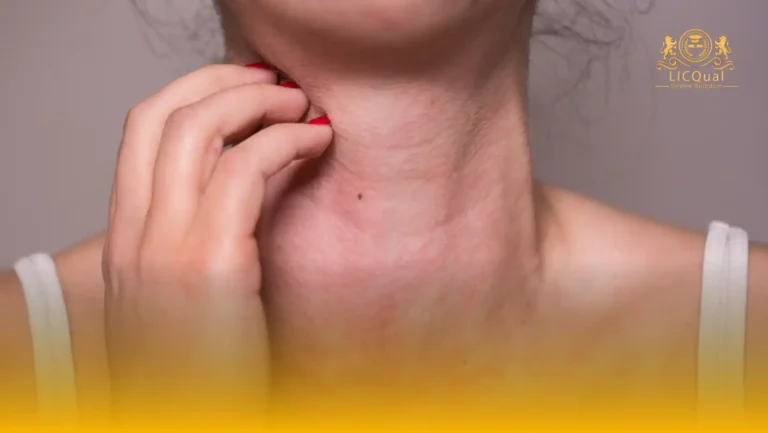The LICQual Level 3 Certificate in Clinical Dermatology (Cert CD) is a specialised qualification designed for healthcare professionals seeking to advance their knowledge and expertise in dermatology. This course is ideal for practitioners who wish to enhance their career prospects, broaden their clinical understanding, and maintain a strong portfolio of Continuing Professional Development (CPD). It provides learners with an in-depth understanding of common skin conditions, diagnostic procedures, treatment options, and patient care practices, equipping them with the practical skills and theoretical knowledge needed in clinical settings.
This qualification is tailored for professionals rather than fresh entrants, making it particularly suitable for nurses, clinical practitioners, and other healthcare staff who wish to deepen their dermatology expertise. Learners will gain confidence in identifying dermatological conditions, applying evidence-based treatment strategies, and delivering high-quality patient care, all of which contribute to improved professional practice and enhanced career development.
Centres delivering the LICQual Level 3 Certificate in Clinical Dermatology must uphold the highest standards of teaching and training. This requires having competent and qualified staff, as well as providing all essential learning materials, resources, and support to ensure learners achieve their full potential. By combining expert guidance with comprehensive educational resources, centres create an engaging and effective learning environment that promotes success and professional growth.
Whether you are aiming to expand your clinical knowledge, improve patient outcomes, or strengthen your CPD profile, the LICQual Level 3 Certificate in Clinical Dermatology offers a structured and practical pathway to achieving your professional goals.
Course Overview
Qualification Title
LICQual Level 3 Certificate in Clinical Dermatology (Cert CD)
Total Units
6
Total Credits
24
GLH
120
Qualification #
LICQ2200826
Qualification Specification
To enroll in the LICQual Level 3 Certificate in Clinical Dermatology (Cert CD), applicants must meet the following criteria:
|
Qualification# |
Unit Title |
Credits |
GLH |
|---|---|---|---|
|
LICQ2200826-1 |
Introduction to Clinical Dermatology |
4 |
20 |
|
LICQ2200826-2 |
Common Skin Conditions and Disorders |
4 |
20 |
|
LICQ2200826-3 |
Diagnostic Procedures and Clinical Assessment |
4 |
20 |
|
LICQ2200826-4 |
Treatment Options and Management Strategies |
4 |
20 |
|
LICQ2200826-5 |
Infection Control and Patient Safety in Dermatology |
4 |
20 |
|
LICQ2200826-6 |
Professional Development and Clinical Practice |
4 |
20 |
By the end of this course, learners will be able to:
Unit 1: Introduction to Clinical Dermatology
- Understand the structure and function of the skin.
- Recognise key dermatological terminology and concepts.
- Identify the role of dermatology in clinical healthcare practice.
- Explain the importance of skin health in overall patient well-being.
Unit 2: Common Skin Conditions and Disorders
- Identify and classify common skin conditions such as eczema, psoriasis, acne, and fungal infections.
- Describe the causes, symptoms, and clinical presentation of different dermatological disorders.
- Apply observational skills to assess skin conditions in clinical settings.
- Understand the impact of skin disorders on patient quality of life.
Unit 3: Diagnostic Procedures and Clinical Assessment
- Demonstrate knowledge of dermatological diagnostic techniques and tools.
- Conduct basic clinical assessments and document findings accurately.
- Interpret patient histories and examination results to support diagnosis.
- Recognise when to refer patients to specialist care.
Unit 4: Treatment Options and Management Strategies
- Explain pharmacological and non-pharmacological treatment options for skin conditions.
- Develop patient-specific management plans based on evidence-based practices.
- Monitor and evaluate patient responses to treatment.
- Advise patients on self-care and preventive measures for skin health.
Unit 5: Infection Control and Patient Safety in Dermatology
- Apply infection prevention and control measures in clinical dermatology practice.
- Identify potential risks to patient safety and implement strategies to minimise them.
- Comply with hygiene, safety, and regulatory standards in clinical environments.
- Promote a safe and professional clinical practice environment.
Unit 6: Professional Development and Clinical Practice
- Demonstrate effective communication and interpersonal skills in clinical settings.
- Apply ethical principles and professional standards in dermatology practice.
- Reflect on clinical experiences to support Continuous Professional Development (CPD).
- Plan strategies for ongoing professional growth and career progression in dermatology.
The LICQual Level 3 Certificate in Clinical Dermatology (Cert CD) is designed for healthcare professionals, medical students, and practitioners who want to build a strong foundation in dermatology. This Clinical Dermatology Level 3 certificate is ideal for those seeking to enhance their knowledge of skin diseases, improve patient care, and gain an internationally recognized qualification. Whether you are a nurse, GP, allied health worker, or aspiring dermatologist, this accredited program provides the skills, flexibility, and credibility to advance your career in skin health.
1. Medical and dental professionals
- General practitioners aiming to strengthen dermatology knowledge
- Dentists managing oral manifestations of skin conditions
- Physicians seeking continuing professional development (CPD)
- Healthcare providers treating patients with common skin disorders
- Professionals looking for an accredited Clinical Dermatology certificate
2. Nurses and allied health staff
- Nurses working in hospitals, clinics, or community health centers
- Allied health professionals supporting dermatology care teams
- Staff aiming to improve patient outcomes in skin disease management
- Professionals seeking a recognized dermatology qualification
- Learners looking for flexible online dermatology training
3. Recent medical and healthcare graduates
- Graduates wanting to specialize early in Clinical Dermatology
- Students seeking a Level 3 certificate to boost career prospects
- Young professionals aiming to stand out in competitive healthcare fields
- Learners preparing for advanced dermatology or cosmetology studies
- Graduates seeking international recognition in dermatology
4. International healthcare professionals
- Practitioners from Pakistan, UK, Middle East, and other regions
- Professionals seeking a globally accredited dermatology certificate
- Those preferring flexible online study options
- Learners aiming to meet international dermatology standards
- Healthcare workers expanding career opportunities abroad
5. Aspiring dermatology specialists
- Students preparing for postgraduate dermatology training
- Professionals exploring careers in dermatology and cosmetology
- Learners interested in skin disease prevention and management
- Individuals aiming to build a strong foundation in dermatology science
- Those seeking a stepping stone to advanced dermatology diplomas
6. Public health and community workers
- Health workers addressing skin health in community programs
- Professionals supporting awareness of skin disease prevention
- Staff collaborating with dermatology specialists in outreach projects
- Practitioners working in rural or underserved areas
- Those seeking interdisciplinary healthcare knowledge
7. Career‑focused healthcare practitioners
- Professionals aiming for career advancement in dermatology
- Learners looking to increase recognition and credibility
- Practitioners seeking higher earning potential through specialization
- Healthcare workers preparing for leadership roles in clinics and institutions
- Individuals committed to lifelong learning and excellence
Centres offering the LICQual Level 3 Certificate in Clinical Dermatology must meet specific standards to ensure high-quality training and successful learner outcomes. These include:
- Qualified and Competent Staff: All trainers and assessors must hold relevant dermatology or healthcare qualifications and possess practical experience in clinical dermatology.
- Access to Learning Resources: Centres must provide comprehensive learning materials, including textbooks, clinical guidelines, case studies, and digital resources to support theoretical and practical learning.
- Clinical Facilities and Equipment: Adequate clinical settings and necessary dermatology equipment must be available to facilitate practical training and skills development.
- Assessment and Evaluation Tools: Centres must have robust assessment procedures, including practical evaluations, assignments, and reflective practice exercises, to measure learner progress effectively.
- Compliance with Regulatory Standards: Centres must adhere to healthcare, safety, and professional standards, ensuring a safe and ethical learning environment.
- Support for Learners: Centres should provide ongoing guidance, mentoring, and feedback to help learners achieve their full potential and complete the course successfully.
- Commitment to CPD: Centres must encourage continuous professional development and support learners in integrating new knowledge and skills into clinical practice.
By fulfilling these requirements, centres ensure that learners receive high-quality, professional training in clinical dermatology, enabling them to enhance their careers and deliver improved patient care.
Assessment and Verification
All units within this qualification are subject to internal assessment by the approved centre and external verification by LICQual. The qualification follows a criterion-referenced assessment approach, ensuring that learners meet all specified learning outcomes.
To achieve a ‘Pass’ in any unit, learners must provide valid, sufficient, and authentic evidence demonstrating their attainment of all learning outcomes and compliance with the prescribed assessment criteria. The Assessor is responsible for evaluating the evidence and determining whether the learner has successfully met the required standards.
Assessors must maintain a clear and comprehensive audit trail, documenting the basis for their assessment decisions to ensure transparency, consistency, and compliance with quality assurance requirements.







